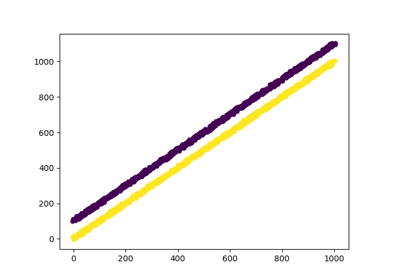sklearn.preprocessing.FunctionTransformer¶
-
class
sklearn.preprocessing.FunctionTransformer(func=None, inverse_func=None, validate=False, accept_sparse=False, check_inverse=True, kw_args=None, inv_kw_args=None)[source]¶ Constructs a transformer from an arbitrary callable.
A FunctionTransformer forwards its X (and optionally y) arguments to a user-defined function or function object and returns the result of this function. This is useful for stateless transformations such as taking the log of frequencies, doing custom scaling, etc.
Note: If a lambda is used as the function, then the resulting transformer will not be pickleable.
New in version 0.17.
Read more in the User Guide.
- Parameters
- funccallable, optional default=None
The callable to use for the transformation. This will be passed the same arguments as transform, with args and kwargs forwarded. If func is None, then func will be the identity function.
- inverse_funccallable, optional default=None
The callable to use for the inverse transformation. This will be passed the same arguments as inverse transform, with args and kwargs forwarded. If inverse_func is None, then inverse_func will be the identity function.
- validatebool, optional default=False
Indicate that the input X array should be checked before calling
func. The possibilities are:If False, there is no input validation.
If True, then X will be converted to a 2-dimensional NumPy array or sparse matrix. If the conversion is not possible an exception is raised.
Changed in version 0.22: The default of
validatechanged from True to False.- accept_sparseboolean, optional
Indicate that func accepts a sparse matrix as input. If validate is False, this has no effect. Otherwise, if accept_sparse is false, sparse matrix inputs will cause an exception to be raised.
- check_inversebool, default=True
Whether to check that or
funcfollowed byinverse_funcleads to the original inputs. It can be used for a sanity check, raising a warning when the condition is not fulfilled.New in version 0.20.
- kw_argsdict, optional
Dictionary of additional keyword arguments to pass to func.
- inv_kw_argsdict, optional
Dictionary of additional keyword arguments to pass to inverse_func.
Examples
>>> import numpy as np >>> from sklearn.preprocessing import FunctionTransformer >>> transformer = FunctionTransformer(np.log1p) >>> X = np.array([[0, 1], [2, 3]]) >>> transformer.transform(X) array([[0. , 0.6931...], [1.0986..., 1.3862...]])
Methods
fit(self, X[, y])Fit transformer by checking X.
fit_transform(self, X[, y])Fit to data, then transform it.
get_params(self[, deep])Get parameters for this estimator.
inverse_transform(self, X)Transform X using the inverse function.
set_params(self, \*\*params)Set the parameters of this estimator.
transform(self, X)Transform X using the forward function.
-
__init__(self, func=None, inverse_func=None, validate=False, accept_sparse=False, check_inverse=True, kw_args=None, inv_kw_args=None)[source]¶ Initialize self. See help(type(self)) for accurate signature.
-
fit(self, X, y=None)[source]¶ Fit transformer by checking X.
If
validateisTrue,Xwill be checked.- Parameters
- Xarray-like, shape (n_samples, n_features)
Input array.
- Returns
- self
-
fit_transform(self, X, y=None, **fit_params)[source]¶ Fit to data, then transform it.
Fits transformer to X and y with optional parameters fit_params and returns a transformed version of X.
- Parameters
- Xnumpy array of shape [n_samples, n_features]
Training set.
- ynumpy array of shape [n_samples]
Target values.
- **fit_paramsdict
Additional fit parameters.
- Returns
- X_newnumpy array of shape [n_samples, n_features_new]
Transformed array.
-
get_params(self, deep=True)[source]¶ Get parameters for this estimator.
- Parameters
- deepbool, default=True
If True, will return the parameters for this estimator and contained subobjects that are estimators.
- Returns
- paramsmapping of string to any
Parameter names mapped to their values.
-
inverse_transform(self, X)[source]¶ Transform X using the inverse function.
- Parameters
- Xarray-like, shape (n_samples, n_features)
Input array.
- Returns
- X_outarray-like, shape (n_samples, n_features)
Transformed input.
-
set_params(self, **params)[source]¶ Set the parameters of this estimator.
The method works on simple estimators as well as on nested objects (such as pipelines). The latter have parameters of the form
<component>__<parameter>so that it’s possible to update each component of a nested object.- Parameters
- **paramsdict
Estimator parameters.
- Returns
- selfobject
Estimator instance.

